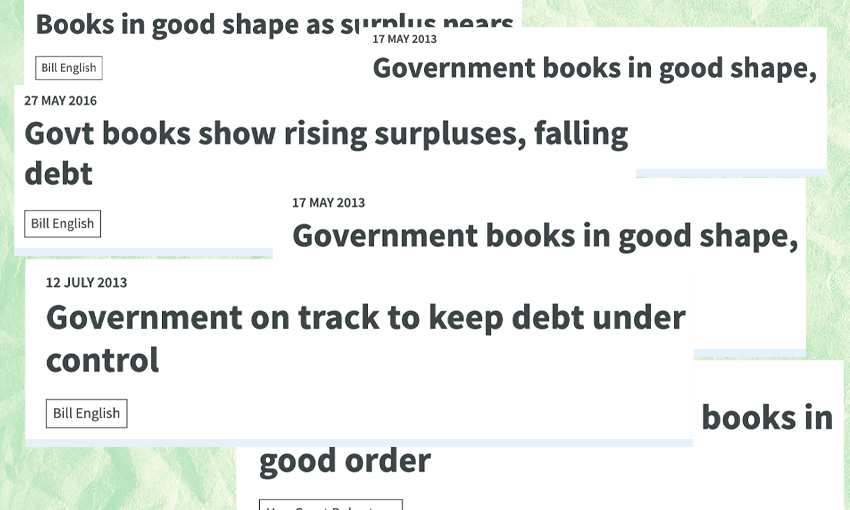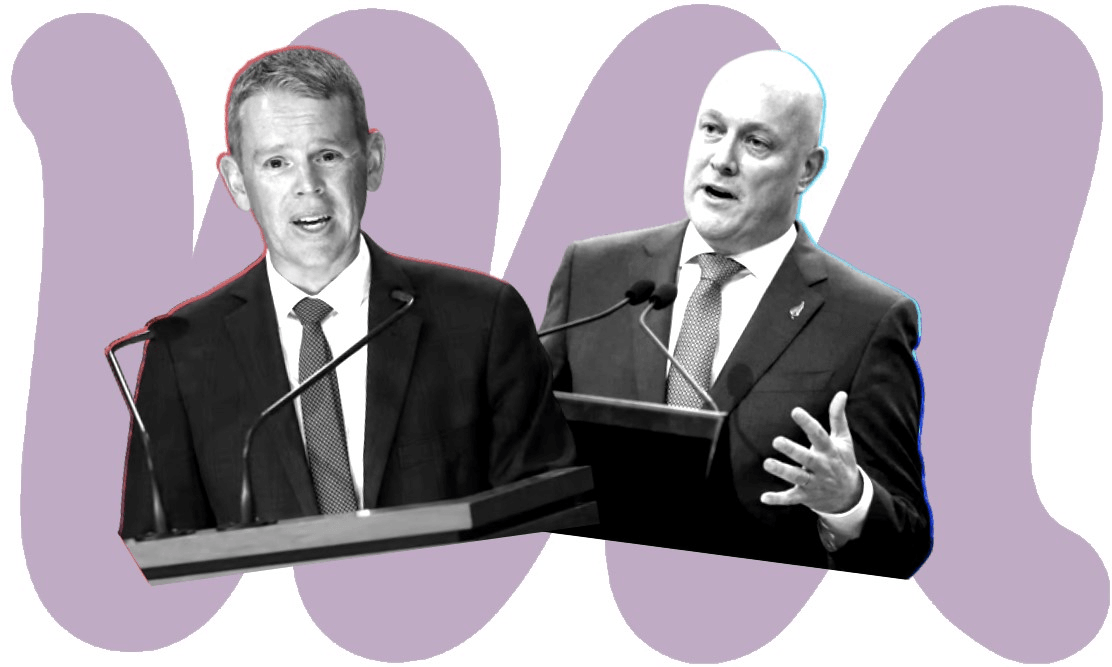Grant Robertson spoke to an audience of New Zealand’s biggest business leaders on Friday, repeating the same impossible line every finance minister says. But Duncan Greive wonders whether there could be a hint of change in the air.
“New Zealand comes into [Cyclone Gabrielle] in one of the strongest positions of any country anywhere in the world,” said Grant Robertson in the Great Room at the Cordis hotel on Friday. He told us this as a few hundred members of New Zealand’s business establishment watched on, eating roasted chicken breast with tarragon and capers, nesting on a bed of broccolini. The lunch is an annual one which might be expected to be approached with a kind of grim sense of duty by Labour finance ministers, but Robertson said “this is actually an event I look forward to”, and sounded convincing.
The business community tends to be naturally suspicious of Labour, but much like Sir Michael Cullen before him, Robertson has successfully manoeuvred himself into a position of grudging respect, which is perhaps the peacetime ceiling for a left-leaning finance minister. As Robertson noted, big events always seem to appear ahead of these speeches, with Gabrielle merely the latest. Over the last 25 years there has been a decent list of them – some man-made (the GFC), others purely natural (the Christchurch earthquakes), and some, like Gabrielle, existing in between. What is striking, though, is that the message from the finance minister never changes.
Any search of the Beehive archives will bring up an almost unbroken list of press releases and speeches in which the finance minister of the day dutifully talks up our relatively low debt and the strength of the government books. What they mean is that we’re not spending too much more than we earn year-to-year, and the scale of our government debt relative to our asset register, the stuff we own, gets approving nods from people who buy and sell debt by the billion.
“The Crown’s fiscal position has been very significantly strengthened under Labour over the past eight years,” said Sir Michael Cullen. “This is our eighth Budget and the books are in good shape,” said Sir Bill English. “This Government has been a net saver for the past six years. We have been running Budget surpluses and paying down debt,” said Bill Birch.
On one level these statements are inarguable. We tend to compare ourselves to two main baskets of countries – other English-speaking nations (the US, UK, Canada and Australia) and the OECD, a larger group of rich countries. If you narrowly assess our debt as a percentage of GDP, the most commonly accepted measure of a nation’s financial health, we are either lowest or among the lowest in those groups.
We pride ourselves on this – somehow, almost magically, a relatively low-tax nation, with a famously simple tax system, globally renowned for pioneering inflation targeting from an independent central bank. It’s part of our self-image within international finance, like an over-eager school student we love the excellent grades we get from our examiners at ratings agencies like Standard & Poors. And they do help! They mean we can borrow money at very low interest rates (more on that in a moment).
The other deficit
Yet there’s another statement Robertson made last Friday, which is also a given, one that successive finance ministers have dutifully acknowledged through the years. “It’s important to note the level of infrastructure deficit New Zealand has,” said Robertson. “[Our] ageing infrastructure networks will need renewing,” said Sir Bill English. And on and on.
Somehow we act like these two facts are unrelated. Even though the same person who prides himself on our prudent balance sheet is the same person who decides how much we spend on bridges and hospitals and housing, there is somehow an implacable distance between the two.
This is embarrassing, because they could not be more related. To put it as plainly as I can: our debt is low because we have refused to spend money building the things we need. That infrastructure deficit is very real – the combined past and future gap is $210bn, according to the Treasury – but it’s not recognised on those balance sheets we brag about, therefore it magically disappears.
At a personal level it’s like driving around in a car with bald tyres, two indicators out and a boot that doesn’t shut anymore after a prang. Yes, the owner has more cash in the bank – but only at the cost of risking their life and the lives of others as a result. Multiply this by five million and you understand roughly where we are as a country – it still works, but it’s a mess and kinda scary a lot of the time.
(Incidentally, it’s not limited to finance – it exists across multiple other realms, from the lack of regulation around slash in forestry, which keeps logs cheap even as homes get wiped out, to quota management in fisheries, which allows us to keep eating fish today even as our oceans empty out for tomorrow.)
It’s the unspoken headlock paradox of New Zealand’s politics, subject to a bipartisan, mutually-assured destruction pact. A typical exchange occurred in 2008, when Labour’s Cullen described National’s plan to borrow to fund infrastructure as “Muldoonist” in 2008.
Basically, if you have to choose between getting a sticker and a biscuit for keeping our debt low and actually spending the necessary money to build and fix our stuff, finance ministers will always, always keep the debt low. This was caused in part by sovereign debt defaults and crises, which rightly chilled governments to the bone – but we are an incredibly long way from such scenarios. The saddest thing is that fear means that we have just, over the past year, seen the abrupt end of a lengthy period in which vast sums of money was available to the government at very low interest rates way out into the future. Now inflation has roared back, and that door is closed.
Will it ever change? The consensus is that it won’t – certainly Bernard Hickey, an observer of the political economy who sees this as the root of most evils, thinks it won’t. But might there be a little glimpse of an alternate mindset in Robertson? While his speech contained that inherently contradictory pair of statements, there was a little nod at the media standup afterwards that hinted at another paradigm.
“You’ll never solve [the infrastructure deficit] in one budget or indeed even in one particular plan,” he said, “but I think given the climate change challenges that New Zealand’s facing, the deficit that we’ve got, the immediate crisis, there is a strong case for us looking at the way we use our balance sheet in terms of investing in infrastructure.”
He’s not alone. National leader Christopher Luxon is also sounding more open to breaking the consensus than ever, telling the AM Show that “we need to invest now very strongly in climate adaptation and infrastructure… we can’t go rebuilding roads that keep getting wiped out and then get wiped out at the next event.”
Up until this point, Robertson has been squarely in the tradition of English and Cullen. Yet perhaps we’re seeing a glimpse of a different side of him. Robertson has now given up his electorate seat. He’s no longer deputy PM, and has farewelled his friend and colleague Jacinda Ardern, knowing her legacy is now all on the public record. He might have only a few months left to write the closing chapter of his, and in those comments sounded more open to rethinking the approach than any finance minister has in some time.
Events, even the most awful, can provide cover for politicians to do things they really want to do, but could not find the will to. The scale of this disaster, which is actually a mere data point on the way to the bigger cost of addressing the climate crisis, arrives at a curious moment in the history of this country and this government. It has awoken us all to how much we’ll need to spend to get back to where we need to be, let alone to respond to the climate crisis. Perhaps Gabrielle might mean that our finance ministers are finally able to admit it too.
Follow our politics podcast Gone By Lunchtime on Apple Podcasts, Spotify or your favourite podcast app.





